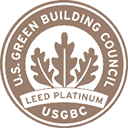
Consumers Define Economic Future – Every Dollar Counts
Consumers Define Economic Future – Every Dollar Counts
- posted on: January 7, 2013
- posted by: 21 Acres
"*" indicates required fields

(Written by Gretchen Garth, President, HumanLinks Foundation and 21 Acres founder. Submitted as an Op-Ed 2010)
As the economy slowly turns out of a steep dive and the nation is guided into a sustainable recovery, consumers can further define what our economic future could be by adding thought into each item we purchase.
Whether it’s toothpaste or clothing, how and where it was manufactured, processed and grown makes a difference. In essence, you’re casting your vote one dollar at a time for the company whose product you purchase adding to their revenues. If you look into a product further, by reading the label or where the item was made, you’re also looking more closely at the company itself, its policies and whether or not through their processes they’re practicing values that you may or may not support.
Some values are pretty self-evident. One new term, described as the triple bottom line, is being taught in MBA courses. This goes beyond the first tier or traditional bottom line: profit and takes into account things like: fair wages; diversity in hiring; no sweat shops; a clean, safe working environment etc… This second tier is sometimes called social justice.
The third tier to the triple bottom line reflects on the environment, taking into account our impact through what and how a company uses our natural resources and also what they leave behind. The triple bottom line is the beginning of how we measure our true costs of each purchase, something that is not talked about much. What are the real costs? How do we account for them?
General measurements have come into play – like organic, green, renewable; new words to help identify values being defined in our new lexicon. Energy Star, VOC-free paint, natural, BHst free milk, recycled and petroleum-based also describe how some things are made with eventual effects on living organisms. This is being calculated into individual consumer decisions. Food miles, emissions, carbon footprint, emphasis on local, are all beginning to play a bigger part in how and what we buy effectively changing our buying decisions into a values oriented system approach. These values then begin to influence buying decisions.
It gets even more personal. Because of things like 9/11 and the current economic upheaval, many things don’t seem so certain. Instinct tells us to trend toward lean, but instinct also tells us to look deeper into what we do every day. So, personally, I started to pay more attention to the products that we use. I read the label to check out if the shampoo lists paraben; started buying local food at the farmers markets; wondered if deodorants made with aluminum might have harmful health effects. As a result, I’ve started paying attention to the companies that produce these products because I want to support ethical business practices.
Acknowledging your personal values with every dollar you spend has already begun to influence the economy. Paper, furniture, home remodel projects, office supplies, stocking your kitchen, garden supplies, technology and automobiles. Every time you make a purchase, you’re casting your vote for a company and how they produce a product. Shareholders have influence on the future direction of a company and you can too, by what you purchase, one dollar at a time.
About HumanLinks Foundation: HumanLinks Foundation was established in 1999 to help Washington State communities make systemic improvements in education, health care and sustainable agriculture. HumanLinks strives to strengthen voices and connections to make these essential systems more effective and responsible. HumanLinks Foundation .










 back to blog overview
back to blog overview







